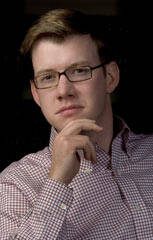Is Rick Santorum right about John F. Kennedy?
The Republican presidential candidate was widely criticized for his unscripted remark that after reading Kennedy’s famous 1960 speech on religion and politics, he “almost threw up.” Santorum objected to what he took to be Kennedy’s argument that religion is a private matter and should not influence political decisions.
For many in the media, Kennedy’s stand on church and state has become, well, an article of faith. The New York Times called Santorum’s response to Kennedy’s “remarkable” speech to the Houston Ministerial Association “one of the lowest points of modern day electoral politics.”
Yet there was one man who knew that Kennedy’s thoughts on religion and politics would be controversial, and in fact, could cause gastro-intestinal distress. That man was Kennedy himself.
“It is hard for a Harvard man to answer questions on theology,” Kennedy quipped following a controversial 1959 interview with Look magazine. “I imagine my answers will cause heartburn at Fordham and B.C.”
In that interview, Kennedy sought to distance his role as a public servant from his private identity as a Catholic. His speech drew sharp criticism, and as a result he was better prepared for his September 1960 speech in Houston. Commonweal’s John Cogley and John Courtney Murray, S.J., tutored him before the talk.
The legacy and content of the Houston speech is still pored over in Catholic circles, notably at a symposium at Fordham University in 2008 in advance of the 50th anniversary of the speech. A review of the transcript of that event reveals why Kennedy’s remarks generate strong responses from readers like Senator Santorum.
Part of what rankles Kennedy’s critics, surely, is what appears to be a less than enthusiastic embrace of the Catholic faith. At Fordham, the social scientist William Galston quoted Arthur Schlesinger: “Kennedy’s religion was humane rather than doctrinal. He was a Catholic as Franklin Roosevelt was an Episcopalian....” Kennedy was not publicly Catholic in the way Santorum is publicly Catholic. In fact, in his public approach to his faith, Kennedy is closer to Mitt Romney than any contemporary Catholic politician.
Galston argued that Kennedy was in favor of a kind of “triple separation.” The first separation, between church and state, is largely uncontroversial today, though it is often conflated with the second—between religion and politics. The third separation concerned democracy and God.
Was Kennedy arguing that religion had no place in the public sphere? Kennedy called his faith a “private affair” and said it did not influence his public views. “There is no indication that JFK regarded the church as having any rightful authority over his public conduct,” Galston said.
Another panelist, the ethicist Shaun Casey, found a clearer connection between Kennedy’s faith and his public office. Casey cited the question and answer session following the Houston talk. “The exchanges there…helped knock down the argument that somehow Kennedy was declaring his Catholicism to be purely private, and hence irrelevant,” Casey said. Kennedy mentioned more than once that his views represented “the great majority of American Catholics.”
So 50 years later ambiguity persists. Santorum’s remarks, though crude, were a visceral display of a debate that remains unsettled. At the Fordham gathering, the Rev. J. Bryan Hehir explained why, on the question of religion and politics, a delicate hand is required: “Religion has a place in the larger political argument, but it is not the totality of the argument, and how you define it and articulate it then becomes crucial.”








I hope that Rick Santorum is not elected president of the United States.
I commend the Post-Standard for publishing "Kennedy, Religion and Politics" in the March 11 Opinion section. I was curious to see what JFK actually said that precipitated such a vehement response from Mr. Santorum. I am a practicing Catholic, too, (as Santorum is) but agree with JFK's opinion on separation of church and state in America as being absolute. I also believe that this protection of religious freedom is an essential element of a democracy.
I read the text of Kennedy's speech carefully and am puzzled that Santorum concluded that Kennedy was indicating "that people of faith have no role in the public square".
I believe that Kennedy's most noteworthy actions as president were faith inspired and gave him the courage to attempt to extricate us from the Vietnam debacle and to avoid a second attack on Cuba and ultimately nuclear war with the Soviet Union. He was aware that this courageous pursuit of peace, and also of social justice through the Civil Rights Movement, was not what the "powers that be" wanted, and that it might cost him his life, and it did. I believe Santorum's interpretation of Kennedy is rash and unfounded. I'm also dismayed that as a former member of the U.S. Senate he doesn't know the real truth.